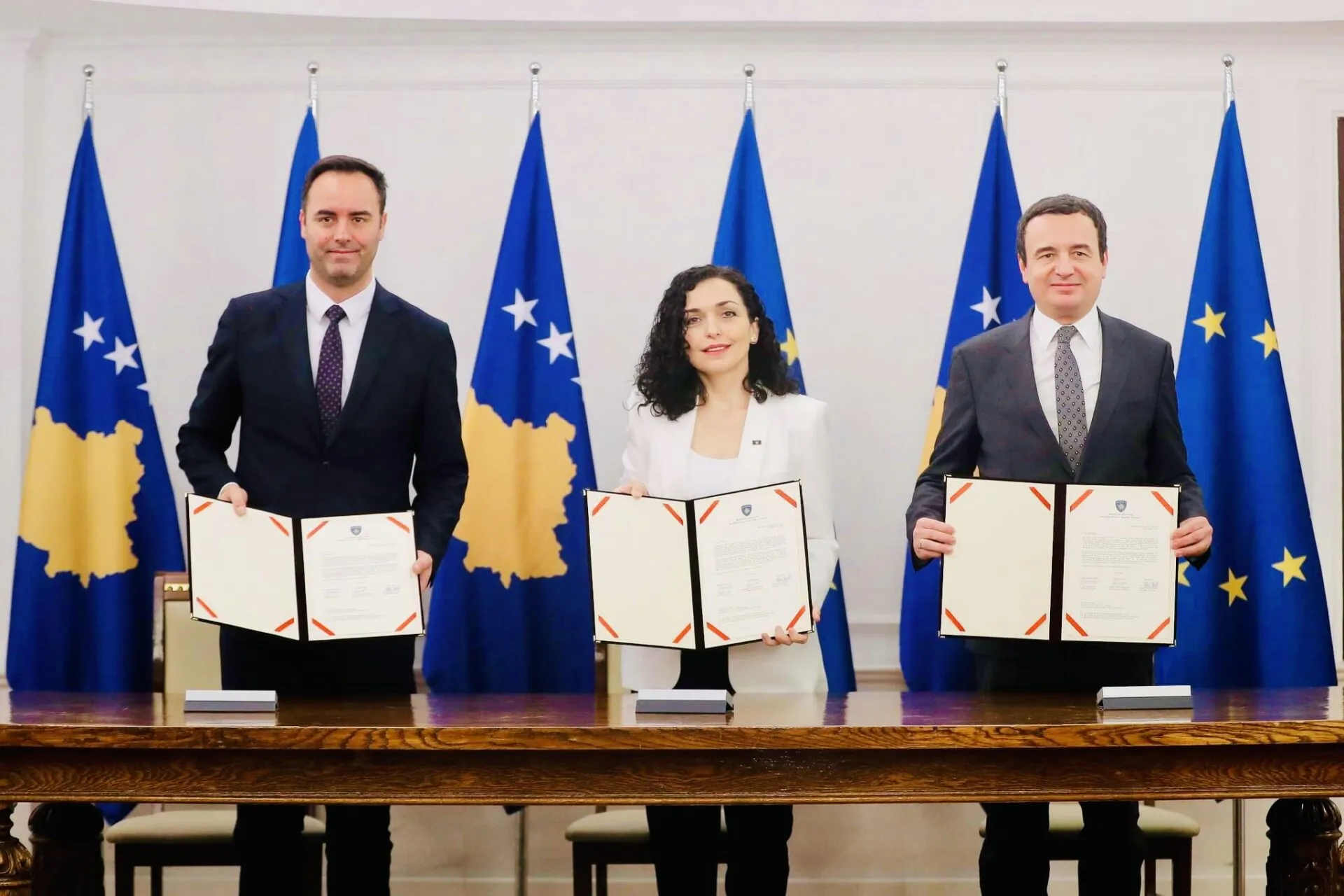Kosovo’s democracy has come a long way, but it needs support

Kosovo, which celebrated 15 years of statehood this year, has recently been in the spotlight. Tensions flared when police escorted newly elected mayors into their offices after a contentious vote held in northern Serb-dominated municipalities resulted in the election of one ethnic Bosniak and three ethnic Albanian mayors, following a turnout of just 3.5 per cent. Ethnic Serbs had largely boycotted the local election, evidently at the instruction of Serbia, and claimed the elected mayors lacked legitimacy. Ethnic Serb protesters attacked and injured NATO peacekeepers and journalists, and the events spiralled into violence and uncertainty.
In response, the EU and the US called upon Kosovo to de-escalate the tense situation and levied economic and diplomatic penalties against the country. Kosovo’s government defended its actions as being crucial to maintaining the rule of law and respect for its constitution but has agreed to reduce the police presence in the northern municipalities. It has also initiated procedures to look for legal ways to hold new elections in these municipalities. Whether these efforts will be worthwhile depends on the full participation of Serbs in the elections.
Kosovo’s leaders described their moves as vital to the country’s democracy, which they claim is the strongest in the Western Balkans. Over the past 24 years, Kosovo has received significant democracy assistance from international partners, especially the EU and the US, and a whole new generation of Kosovo citizens has grown up in an era of freedom and democracy. The echo stemming from the uncertainty and increasingly belligerent rhetoric from Belgrade makes it important to objectively assess the validity of statements.
Figure 1: Global State of Democracy Indices framework
Kosovo’s democracy by the numbers
According to the Global State of Democracy Indices (GSoDI) data, Kosovo’s democracy has experienced substantial expansion over a span of 10 years, with improvements across seven different indicators, particularly in areas related to Representation, the Rule of Law, and Basic Welfare. In comparison, only four other significant improvements occurred in the entire region during this period.
Figure 2
The complicated relationship between Kosovo and Serbia, in which the latter has persistently refused to recognize Kosovo’s independence and has actively sought to undermine its institutions, justifies a comparison of the two countries’ democratic performance over the past five years. Kosovo has emerged as the leader in significant improvements over a five-year period within the region, while Serbia has faced significant declines despite still ranking higher than Kosovo in three out of the four GSoDI democratic categories.
Figure 3 (Interactive graph; click drop-down list to change categories)
Health check of democracy in the Western Balkans
The latest GSoDI performance rankings show Kosovo to be the Western Balkans’ biggest climber in 2022, moving up in all four categories (Representation, Rights, Rule of Law and Participation). Despite these advances, however, Kosovo ranks last among its regional neighbours in Rights and Participation. Some of the most daunting challenges pertain to access to justice – particularly judicial accountability and fairness of trials.
Figure 4
Additionally, the country struggles with freedom of movement – mainly due to restrictions on foreign movement, as Kosovo is currently one of the most isolated countries in Europe. The EU has finally agreed to end visa requirements for Kosovo citizens as of 2024.
When it comes to the freedom of the press, according to the GSoDI, Kosovo had the highest rank in the Western Balkans in 2022. However, the recent attempt by the government to suspend the business license of Klan Kosova, one of the biggest broadcasters, citing irregularities in registration was deemed concerning by the international community, experts and the opposition. This action should be watched, along with the lack of financial and ownership transparency of several media outlets. According to the Western Balkans Security Barometer, the media, along with political parties, are among the least trusted institutions as they are viewed as corrupt and untrustworthy.
These examples demonstrate that Kosovo, as a young country with fresh institutional memory and experience, faces both modern global complexities and wounds from the Balkan wars (including the unresolved conflict with Serbia) as it seeks to continue on its democratization trajectory.
Looking beyond the data
There are other key signifiers of democratic health. Kosovo is currently led by its second female president, and its legislature consists of 40 per cent women, exceeding the 34 per cent OECD averageof women in parliament. A recent survey indicates a decrease from 29 per cent in 2021 to 8 per cent in 2022 of citizens who regard corruption as the most important problem facing their country. Relatedly, citizen perception data indicates that Kosovo citizens’ trust in their government has grown and that they are more satisfied with democracy. Indeed, the Balkan Public Barometer indicates that their trust in the government is the highest in the region. Kosovo has proved its ambition in being an active democracy defender as well – agreeing to shelter Afghan refugees, sanctioning Russia and supporting Ukraine.
With respect to relations with the Serbian minority (3 to 5 per cent of the overall population), there are several challenges that still need to be addressed, including inter-ethnic mistrust and cases of hostilities. However, the Serb minority, which the Serbian government has pressured to deny the legitimacy of Kosovo’s institutions, enjoys extensive constitutionally protected rights in Kosovo. These include legislative representation (out of the 120-seat parliament, 10 of the 20 seats reserved for minorities are guaranteed for the Serb minority), recognition of the Serbian language as an official language, and veto power on minority issues.
However, the de facto integration of ethnic Serbs is a persistent obstacle, mainly due to intimidation coming from Belgrade-backed groups. The most notorious case is that of the assassination of Oliver Ivanović, one of the leading Kosovo Serb politicians. Ivanović’s family believes he was murdered for standing up against Srpska Lista, the dominant Kosovo Serb political party backed by Serbian President Aleksandar Vučić, which is responsible for the recent boycott of local elections in Kosovo. Recently, new police officers from the Serbian community who joined the Kosovo Police in the northern municipalities were the target of threats coming from various Serbian online pages.
Strengthening democracy in Kosovo—and in the region
Kosovo’s significant democratic growth over the last decade is a positive sign, but it remains to be seen whether these advancements will translate into sustained progress over the long run. For a young democracy to survive in the face of various risks and uncertainties it is important to recognize its progress and provide it with continuous and principled support. Countries dedicated to upholding and safeguarding democracy should acknowledge Kosovo’s endeavours to strengthen its democracy. An important step in this regard is the recent call of 10 European and US Chairs of Foreign Affairs Committees and 56 Parliamentarians, including the Chair of Ukrainian Parliament’s Committee on Foreign Affairs, Oleksandr Merezhko. The letter calls on the EU, US and UK to work on a revised approach that provides a “balanced and proportional interaction with Kosovo and Serbia” and requests the international community to ensure that a Belgrade-centred policy is not adopted for the Balkans.
Another important step could be the reassessment of the recently introduced sanctions and the endorsement of the government’s efforts to establish the rule of law in the northern municipalities. If local elections are rerun, it is essential that malign foreign interference is eliminated. This would have potential security and strategic benefits in the fight against organized crime and regional instability, as well as in Kosovo’s effort to promote equality among citizens, safeguard minority rights, and foster genuinely positive inter-ethnic relations between Kosovo Albanians, Serbs and other minorities living in Kosovo. Particularly in light of Kosovo’s democratic progress and strong Euro-Atlantic ambitions, the international community’s support is essential in advancing democracy in the region and beyond.





